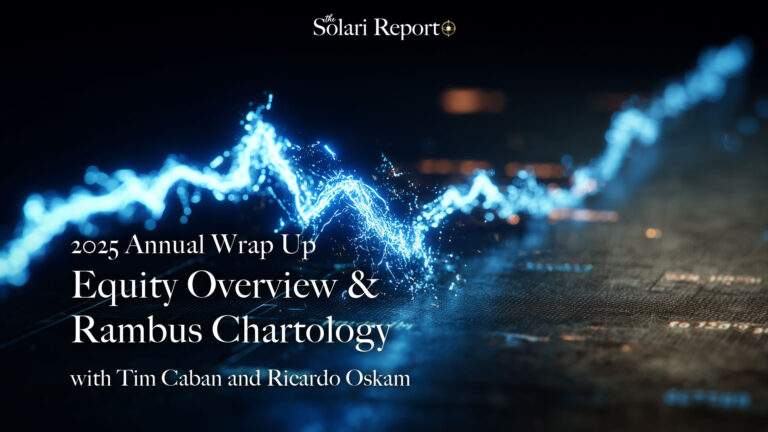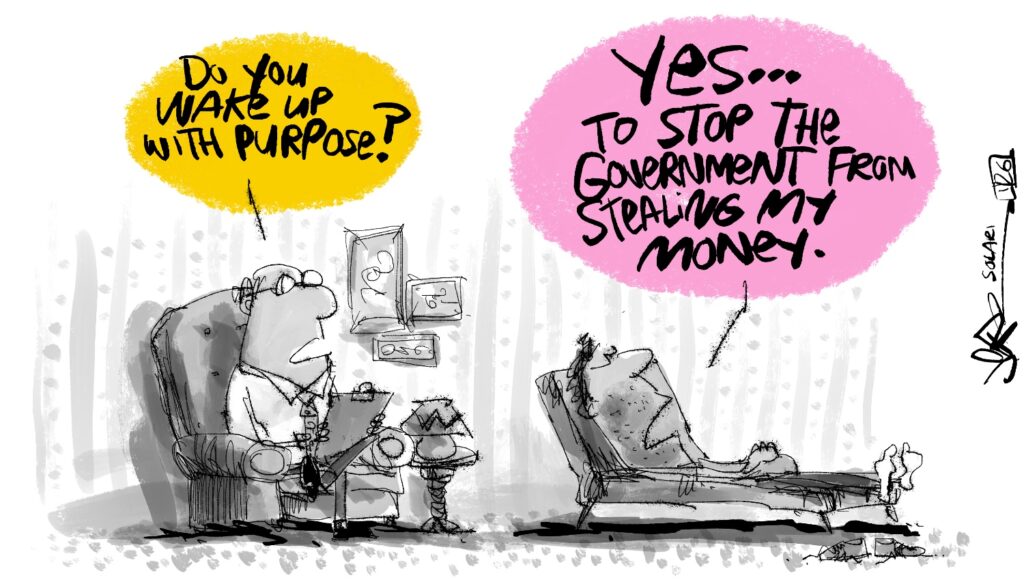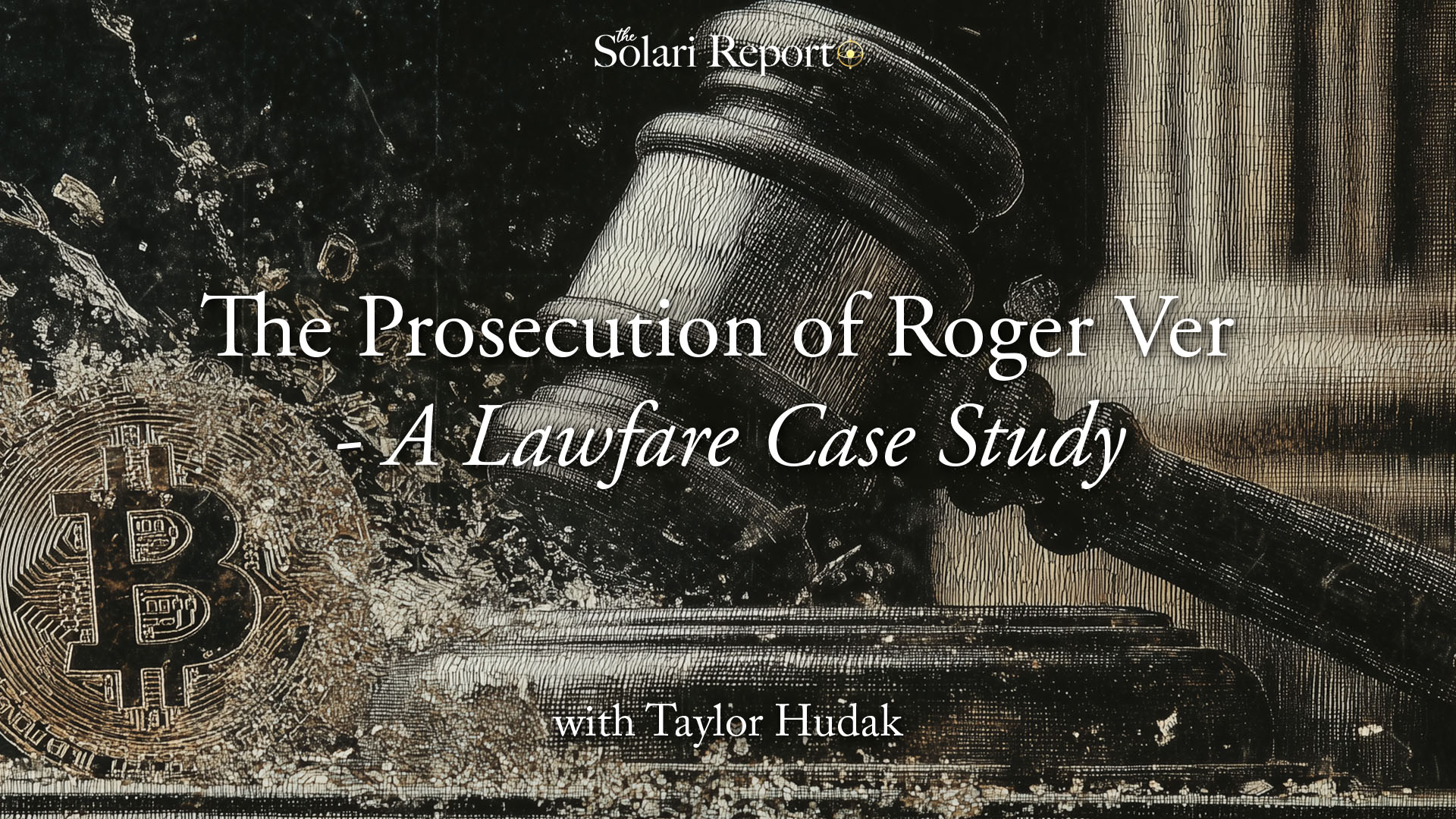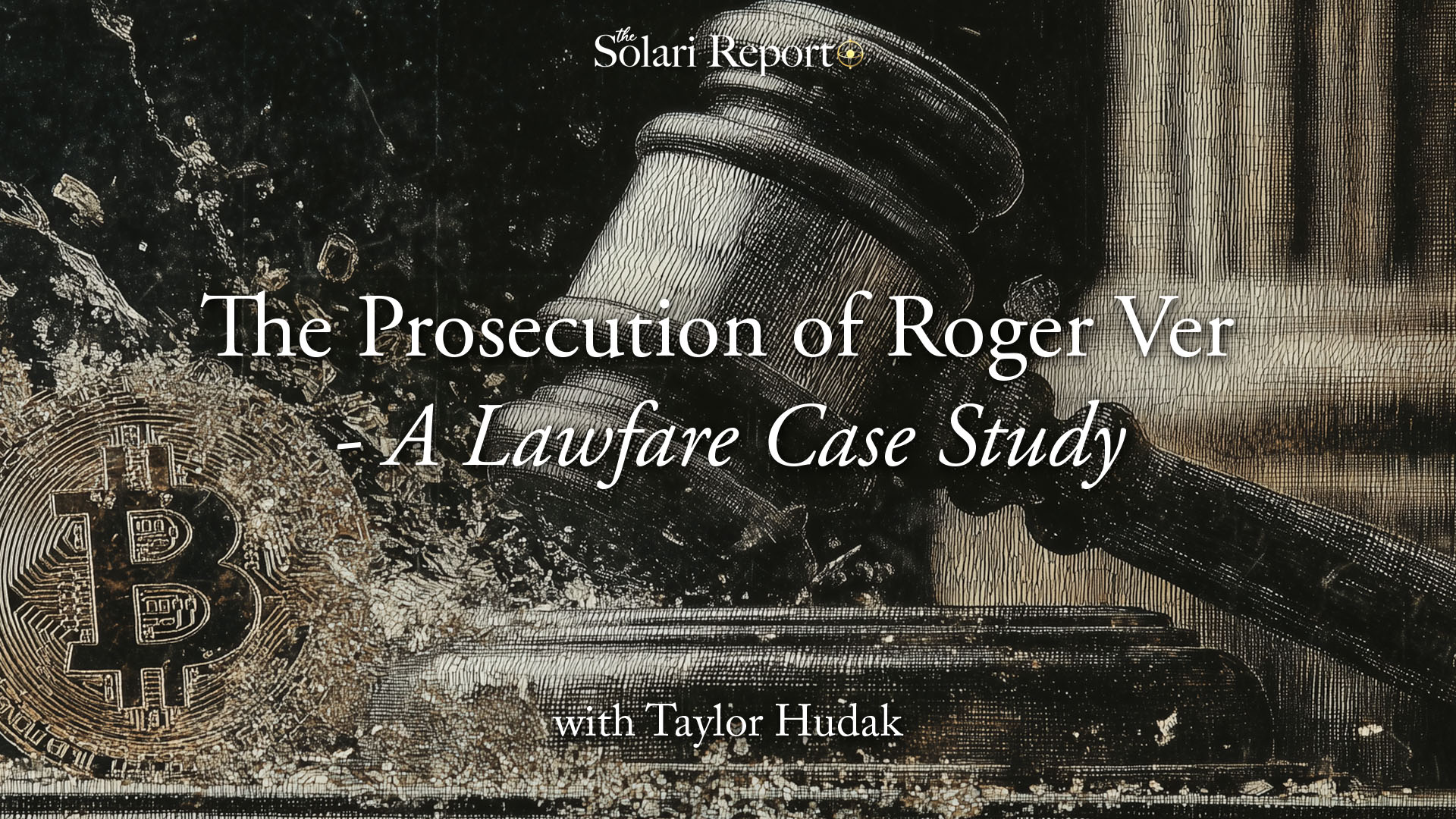Ladies and gentlemen,
welcome to the Solari Report.
We are here with American Hungarian
journalist Taylor Hudak to discuss
her new blockbuster publication
on the report, the Prosecution of
Roger Ver a Lawfare Case Study.
Taylor, first of all, congratulations
on an amazing demonstration of
excellence in journalism, and
welcome to the Solari Report.
Thank you.
It’s great to be here and to
speak with you about this case.
So you’ve been working
on this for a while.
When did you start your research
on the prosecution of Roger Fair?
Yeah, so I actually started in December.
I took a little bit of time off
earlier in the year and then
got back to it around February.
It required quite a bit of
research to work through all of
the material, the various exhibits.
The submissions from the defense, as
well as the prosecution, as well as
researching things that Roger Bert
has stated in the past, looking at
his various interviews and speaking
with various legal professionals about
the tax implications of Expatriation,
the expatriation process itself.
So this was a huge project,
a huge undertaking.
And first I do wanna thank several
individuals who I have spoken with who
helped me acquire a deep understanding
of this case and the related issues.
And that is Attorney John Richardson,
attorney Anthony, parent, attorney Robert
Barnes and Tracy Thurman, of course,
who is a legal advocate on the VER case.
So I think all of those individuals
for helping me in understanding this
case, this was a huge undertaking
and I really do hope that.
It provides transparency and also is
informative to those who may not know
too much about the case and are eager
to learn more and understand those fine
details because this really does showcase
the fine details in the Bear case.
So I just wanna talk a little
bit more about your background.
You published for the Last American
Vagabond wonderful website, Ryan
Christian and also for activism Munich.
And you did great work for the CHD Europe.
You’ve done other things with the report.
One of your specialties has been
oftentimes when people are targeted
for political reasons one of the
protections that protects the prosecutors
is, they make the case hopelessly
complicated and you now have a record
of taking some of these cases and.
Basically making what’s happening,
understandable and accessible.
And the first one you did a big so
you’ve worked with doctors for COVID
ethics and you did a big and long very
in detailed video about the sort of
targeting of Thomas Bender, the Swiss
cardiologist, and it was remarkable.
And you also did a very detailed
interview on a Burkhart before he died.
The pathologist who really proved
that mRNA technology really backed
up suture at Bhati and Dr. Michael
Palmer and proved the dangers of that
basically mRNA technology is a killer.
And then of course my favorite
was when Sutured BTI was targeted
by the German prosecutors.
Just describe a little bit what you
did, because it was such a remarkable
example of this kind of journalism.
Thank you.
Yeah, so I’ve always been drawn
towards covering court cases.
It’s something that just interests me.
I feel like I can grasp
legal concepts quite well.
I would say it’s something that
just generally interests me.
And so one of the ways
that we were able to.
Help bring transparency to Professor Dr.
Suture at B’S case was by laying out all
of the case details similar to what I
have done with the Bear case, where we
create a timeline of all of the events
that happened in the case, the relevant
events, and that this way it is difficult,
let’s say, for the prosecution or anyone
to mischaracterize the facts of the case
or to try to, let’s say, pull something.
So it’s really important to just lay out
all of those details in a way that’s easy
for the public to understand and consume.
So that’s what I did
with the Back to Case.
I also did it here now
with the their case.
And one important point with
this too is that it is impartial.
So this is a collection of material
submitted by both the prosecution
and the defense, and it’s up to
you, the listeners, the readers,
to make up their own minds.
About what they think about this case,
the bear case or what they think about the
BTI case, which is in fact still ongoing.
However, fortunately in May of
2023, he was found not guilty
on the charges against him.
So that was a great victory and I
would like to think that our efforts
putting together that timeline, I had
a, role in that and at least bringing
awareness to the general public.
So that’s exactly what we did here.
And again, I cannot emphasize
enough the importance of the fact
that this is all of the information
presenting both sides and it’s on
you to, make sense of, these cases.
I was thrilled in the BTI case
because I remember how many
people said it’s hopeless work.
Did we, had to live through it.
A, lot of we got yelled at a lot about
it was hopeless and what a waste of time
this was, and we shouldn’t be doing this.
And Right.
You were magnificent.
You just didn’t, I call it fighting
with the nothing, you just didn’t
let the nothing get to you.
Thank you.
But what you saw that, that was
German to English as well so you
had to do all the translating.
It was, yeah.
It was a lot.
Yeah, it was a lot.
And what was amazing to me was
suture had so much public support.
He did, but his public couldn’t grapple
with the extraordinary complexity of both.
His biography.
One of the things that happened is we
posted a biography that showed you what
a remarkable record he has remarkable
experience, remarkable accomplishments,
and then the timeline and that it,
it’s when you published all of this.
Then you saw an explosion of public
writing in defense of Bhati because
they were standing on solid ground.
They had the facts, they had the
links, they had the the English
speaking audience had the documents.
And that was, it was remarkable
how much popular support there was.
So I, do believe your work had an
extraordinary impact and I was very
enthusiastic, particularly after we’d
battled the nothing for quite a while.
We did, There was a lot of pushback
against this, a lot of general feeling
that perhaps this was not a worthwhile
effort, but it absolutely was.
And not to get into too many details
with that case, but in fact, one of
the points that was brought up by
the defense in that case was that the
prosecutor had made an error with regard
to the investigative process in which.
She closed the investigation may of 2022,
and on the same day, she was also seeking
to obtain additional evidence, which was
improper to do that in the German courts.
And again, for those specific details,
I hope I am remembering them correctly.
I would refer all of you to go
to the doctor’s for COVID ethics
website to look at that timeline.
But these things are extremely helpful.
And with this case, the VER case,
I’m just looking at the article right
now, I have to say, Catherine, when
I was working through this material,
I thought to myself, this is scary.
This is scary what they’re doing.
I have experience covering similar
cases like I’ve mentioned BTI
case, but also the Assange case.
So I’m not at all surprised that the
US government and the prosecution
would be deceptive in an indictment.
And here they were incredibly deceptive.
They intentionally withheld certain
information from the public.
It was truly astonishing.
Perhaps I really should
not be shocked about.
No, it’s not for me.
It’s not astonishing.
I know, But it, was just I thought what
how does how can one maintain this sort
of case moving forward when there is
evidence right there and available that
exonerates bear of the accusations.
I would encourage everybody to
check it out for themselves.
You will be surprised or perhaps
you won’t be too surprised.
I will not be surprised.
Yeah.
But here’s the thing.
I discoVerd litigating and I think
it’s demonstrated by your work
with on the BTI case, but it’s
demonstrated here and that is the law.
The law really can work and facts
really matter, but the question
is how do you make sure that
busy people and a busy public.
Can, get the facts and get the law
and put them together in a way that
brings the kind of support, because
there’s the court of law and there’s
the court of popular opinion.
There is, and it matters what happens
in the court of popular opinion
when it’s based on the facts and
the law, but making the law and
facts accessible that’s the role of
great journalism and it’s hard work.
It takes a lot of work and it’s hard work.
And that’s what, you know when,
you get a malicious prosecution,
which I believe this is.
But when you get a malicious prosecution
it, it’s a real investment to, make sure
the facts and the law is made accessible.
Because one of the things the
prosecutors do is they make it hopelessly
complicated and the law is complicated.
Anyway, so I that’s why I think these case
studies really make a difference and I’m
very appreciative that we were willing to
do this one and undertake it because as
I said, when we were looking at getting
this up on the web, this is a bear.
Yes, it is a massive, report.
’cause it’s a complex case, intentionally
complex to confuse the public.
It makes it easier to
deceive the public as well.
On the various facts.
So that is intentional and hopefully
with this report, it’s crystal clear to
everybody what the charges are, how the
US government came about prosecuting
there, and the evidence that exonerates
him the evidence in his favor, the
evidence is clearly in his favor.
And so it’ll be very interesting to see.
Now I should point out that Tracy
Thurman has done and Roger Farrah
has done at their own website, they
have done a great job of getting a
lot of the material available and
and the documentation available.
And that did make it a little bit easier
than in the BTI case in that sense.
Absolutely.
Yeah.
You’ve done a great job making that
information available to the public
to allow for people like myself and
others to assemble it, make sense of it.
So that was extremely important
and I really do value.
At the time, and the fact that they were
able to put that together and that bear is
also free to advocate for himself as well.
That’s important because in other
cases, and in fact in Bear’s case
as well, the US government wanted
him to be imprisoned during this
entire time while facing extradition.
Fortunately, he is not
in jail at this time.
However, he is of course, awaiting
potential extradition to the us
don’t wanna diminish how difficult
that must be psychologically to know
that you could be shipped to the
US and, never see freedom again.
So, if I’m not mistaken, let’s
go into the story and tell
the story of, what happened.
And you were there when the
prosecution began, correct?
You were at the conference
where he was expected.
So I actually yes.
So I actually met there briefly.
I don’t even know if
he would remember this.
I, met him, spoke with him.
About exact, almost
exactly a year ago now.
And this was just a few
months after his arrest.
This was in Majorca.
I was there attending a crypto conference.
Oh, okay.
I thought you were the
one where he was arrested.
No, I wasn’t at that one.
Okay.
But just to, for clarity
for the listeners.
So what happened was is that in
April of 2024, there was attending
a crypto conference in Spain,
mainland Spain, not Mayorca.
And he thought he was gonna be
in Spain for just a few days.
He was attending a crypto conference.
I was not at that conference,
and he was arrested there while
in Spain, and then eventually
sent to Mayorca where extradition
proceedings took place and unfolded.
I met him in Mayorca in July.
So this was just a few
months after the arrest.
Okay.
So walk us through this
story of what has happened.
Basically, if you go through
this report and for those
who don’t know Roger Ver, many do.
He’s very
well known in the crypto community.
He’s a crypto pioneer.
He’s a businessman, an entrepreneur.
I really get the sense when researching
him is that he is somebody who is very
he is an entrepreneurial spirit and
he’s just one of those people that
is very engaged and a real go-getter.
And I do wanna also make
note that he’s also a, an
incredibly kind and nice person.
Of course I met him for a brief time, so I
don’t know him personally or anything like
that, but he was a, an extraordinarily
nice man, good person I could tell.
And we should all just really
he’s been very generous.
So he’s made a lot of money on, he’s, yes.
He, made a lot of money on Bitcoin and
he’s been very generous in investing
or gifting or helping other people.
Yes he has been involved in
various humanitarian causes.
And then also too, Tracy Thurman, a
legal advocate on the case, has stated
publicly in various interviews that he
was also funding and supporting various
efforts for those who are part of the
resistance, the anti lockdown movement,
the various pro medical freedom groups.
He was also involved in helping to
support Julian Assange and others who
have been persecuted by the US government.
So this is somebody who yes, has acquired
a lot of wealth, who has been extremely
successful, but has also given back
to the community and has done his part
to advocate for those who are maybe
a little bit less fortunate as well.
And he was the big supporter
of Ross Albrecht and as Yes.
And, Lynn Albrecht.
Yes.
And contributed mightily to their efforts.
And they did a similar
presentation timeline.
Website and, I think Roger’s
funding helped tremendously.
And Ross Brook is now free.
Exactly.
Yeah.
And I think it’s absolutely due to
the advocacy and the help that was
provided by Roger Bear, he has really
made a positive impact on the world and
perhaps that’s what makes him a target
for the US government because his being
a target has gone on for many years.
You’ll see in the report this dates
back to his early twenties when
he ran for office in the state
of California as a libertarian.
He was eager to share these ideas of
the free market, personal soVerignty,
freedom of transaction as well.
And he caused quite a bit of a stir, I
can tell, in the state of California.
And then unfortunately became subject
to selective prosecution and then
had pretty much throughout his
entire adult life from what I’ve been
able to research, has been audited.
By the IRS.
And he has maintained to this day
that he did everything correctly.
And you’ll see in the report that
he did do everything correctly.
And he relied on his legal team,
he relied on expert tax advisors
on how to manage his exit tax.
And that, that’s precisely what he did.
So essentially what happened was
he, early on offended I would say
the enforce some enforcement people.
I wanted to tell people about these ideas.
And so one of the ways that I thought
would be efficient to tell more people
around the world about the benefits
of free markets and entrepreneurship
and, getting the government outta
the way of the economy was to run
for political office as a libertarian
in the United States, each candidate
is gonna be given five minutes.
I got to have numerous debates and
meet lots of interesting people.
But it was in one debate in particular
at San Jose State University.
Where I was debating the Republican and
Democratic candidates, and unbeknownst to
me at the time in the audience were some A
TF agents and I called the A TF and FBI, a
bunch of jack booted thugs and murderers.
In reference to murdering
children in Waco, Texas
9 1 1.
What’s your emergency?
They’re shooting at us at Mount Carmel.
Tell ’em their children and women
in here and they call it off.
There were dozens of young children there.
They literally sent in tanks and men
with guns, and they set the entire place
on fire, and then they posed for photos
on top of the bodies of dead kids.
Branch Davidians, including
24 children were killed.
You.
Don’t murder kids.
And when Bitcoin came along,
it was clear to me that was the
kryptonite to government’s ability
to wage wars and to control people
and to interfere in the economy.
And there was nothing that was going
to stop me from telling people about
how important this was for Roger.
That was the beginning of asking very
serious questions about the US government.
And honestly, it was the beginning
of the persecution against him.
Before crypto, I had been involved in
e-commerce and I was selling mainly
computer memory on the internet.
And I was also selling a product
called a pest control report, 2000,
which was basically a firecracker
that farmers could use to scare
birds away out of the cornfield.
And I was selling these on eBay.
Back when eBay had a guns and ammo
section and there were dozens if
not hundreds of other people selling
that exact same product on eBay.
I wound up being the only person
ever in the entire history of the
world to be charged criminally for
selling those without a license.
Ended up being prosecuted for, he was
an entrepreneur, marketing products on
eBay, et cetera, got targeted and, that
led to basically a series of unpleasant
including three months in, I think
it was three months in prison, but he
ended up deciding to leave the country.
And, I sympathize.
I can understand that as well.
And so if you look at, why he
left the country, it was perfectly
logically moved to Japan.
And then eventually got arranged
citizenship in the Caribbean and decided
to leave his or to, I forget what the
word is to drop his American citizen.
So he, exit.
Yes.
Yes.
So he chose to exit his
American citizenship.
Yes.
And of course, you go into the law related
to when you exit American citizenship, you
have to pay an exit tax on your assets.
Exactly.
And he, yeah.
So describe the challenge
of exiting oh, gosh.
As he did in approximately 2014.
You renounced your citizenship.
Sorry, you left the US in 2006.
You renounced the citizenship in 2014.
So I have two questions there.
Number one is why not
renounce it when you left?
And then the second one
is, why renounce it?
Why couldn’t you maintain your citizenship
but just live outside the country?
So the first question, why
didn’t I do it earlier?
I wanted to, the moment I left the
us I literally hired hired a former
IRS agent, ironically enough to look
into what it would take for me to
get citizenship somewhere else and
and not be a US citizen anymore, just
because it was so frightening for me.
And I’ve been terrorized by those people
the last time around as a young man.
And the truth of about it is it’s really
difficult to get citizenship somewhere
else and takes a lot of time and effort.
And when I was 26 I, wasn’t in
a position really financially to
do that would’ve taken almost all
of my net worth at that point.
And so at that point, I just decided
it would be safer to live outside of
the US and maybe I’d renounce later.
And when I finally did manage to renounce,
it took until 2014, but I started
working on that full-time as well.
In 2000 and 11.
And so it took three full years before
I could even get another citizenship and
be able to renounce my US citizenship.
And the only reason I did it is it’s
not because I hate America, it’s
because I didn’t feel safe from some
of these petty bureaucrats and law
enforcement people in the US that
just want to target somebody that has
different political views in their owns.
So the, reason it took so long
is because it’s really hard to do
if you haven’t been through it.
It’s really difficult and it’s
even more difficult as a convicted
violent felon in the us that’s
haunted me to this this very day.
Banks don’t wanna deal with me.
It’s just such a, difficult
situation to be a felon in the us.
Like certain countries even don’t
wanna let me in because because I
have a felony conviction in the us.
Alright, so there’s an entire section
that is dedicated to the Expatriation
process and before I get into this,
I would just refer everybody to the
work of Attorney John Richardson.
He is an expatriation lawyer and expert
in this area and I consulted with him as
I was putting together this section of
the report ’cause it is quite complex.
So I’ll just first start by saying
that in the United States, the
14th Amendment makes clear that an
individual born or naturalized in
the United States is a US citizen.
However, the 14th Amendment speaks
only to which individuals have a
constitutional right to US citizenship.
It does not address at all whether or
how one may relinquish US citizenship.
However, of course, Americans can
relinquish their US citizenship.
This is a process called expatriation,
and it’s important first and
foremost to understand expatriation
as an immigration and citizenship
issue, as well as a tax issue.
So it’s a immigration and
citizenship issue that may trigger
significant tax implications.
So the immigration related procedure to
expatriation is governed under the INA,
the Immigration and Nationality Act,
whereas the tax implications that may
follow Expatriation is governed separately
under the Internal Revenue Code.
And this is described in detail in
this report in INA Section 3 4 9 A.
Lists seven possible ways that one
may relinquish their US citizenship,
where it lists seven possible
triggering acts that lead to the
relinquishment of US citizenship.
The one that I think applies in Bear’s
Case, because the documents do not provide
sufficient clarity, is Ves obtaining
or naturalizing as a citizen of St.
Kitts and Nevis on February 4th, 2014.
However, his naturalization on February
4th, 2014 was only his relinquishment
of citizenship under the INA.
It did not terminate his status as a
US taxpayer, so he had to physically go
to a US embassy somewhere in the world.
He did in Barbados on March 3rd, 2014
and made a request for A CLN or a
certificate of loss of nationality, and
that was considered the date of VA’s
Expatriation for tax purposes, because
VA was a coVerd expatriate, he had a
net worth of greater than 2 million.
He was then required to pay an exit
tax in which an individual is required
to calculate the value of all of
their property and assets, and then
calculate a hypothetical sale of
that property the day before he or
she expatriated for tax purposes.
So that is the source of about three
or four of the charges against Fair.
And again, for greater detail on this,
you can find that in the expatriation
process section of the report.
So let’s just run down the
support or the report and show
you the different sections.
So if we go to the Solari Report,
and you can always click this,
either now it’s on the homepage,
but you can also go to latest and
you’ll find it or the search engine.
If we open up the article, here we
go, the prosecution of Roger va.
You start off with an introduction.
Just walk us down through the article
and show us how it’s organized.
Yeah, sure.
So you’ll see that it opens with
a general background information
about va, who he was and his
introduction into the political world.
As I mentioned earlier, his
running for office as a libertarian
when he was just 21 years old.
His entrepreneurial spirit, which
led him to build businesses that.
Grew to become very successful businesses.
And then at around this time
in, 2011, ver discovers Bitcoin.
He’s super enthusiastic
about it, excited about it.
He really sees this as a way to
liberate people and to allow for
people to have freedom of transaction.
And then I also do get into,
in this section, are you Roger
Ver? Are you Roger Ver?
This is a brief overview
of exactly what happened to him
when his, when he was arrested.
I decided to highlight that moment because
I thought it was absolutely terrifying.
It just shows that the US
government has so much power
in other places in the world.
They waited for him to be physically
in Spain because they knew that they
were likely to comply with extradition
requests in Spain, which they’re
not legally allowed to do that.
They can’t wait for you to be in
a jurisdiction in which they feel
that you will likely be extradited.
They’re supposed to just seek your
extradition wherever you are located.
So let’s just run down the article.
I wanna show that and then come back
to the case against Roger Ver. So
next you go through the case and the
different counts in the indictments.
Let’s just roll down through the
indictments and let’s keep going.
We’ll come back to the indictments
when we go in, but I just
wanna show everything here.
So then you, okay.
Yeah.
So we get into that chart,
which is all the details, the
dates of the various counts.
There’s eight counts, and then
I discuss the arm raid that was
committed against various tax lawyers.
The IRS Criminal Investigation
Division violated various
attorney-client privilege.
That’s a whole other issue that is
addressed in the motion to dismiss.
I also thought it was important to
highlight legal experts who have
assessed this case and feel strongly
that VA’s unfairly being prosecuted.
I was able to find several of them,
as I mentioned earlier, attorney John
Richard Richardson, attorney Anthony
parent, attorney Robert Barnes, who
many are probably familiar with.
He’s been really vocal about this case.
They all say, look, they’re
follow the proper procedure.
They’re going after him in
an unprecedented manner.
The normal procedure is to go
through civil collections first.
You don’t go straight
to prosecute somebody.
And this is something that I also had a
hard time wrapping my head around why they
would do this in such a unusual fashion.
Attorney parent also brings up
a really good point that this is
perhaps really not about taxes,
but rather fear and intimidation to
prevent people from expatriating.
And I actually think there
is a lot to be said there.
I do think the US government
does not want wealthy people.
Expatriating, if you look throughout
the history, which is also included in
the report, they have made it, in my
perspective, more and more difficult
to expatriate from the United States.
They have this new, or they implemented
a new policy at the time in June, 2004,
that you can lose your US citizenship
for immigration purposes, but still be
taxed if you don’t file the form 88 54.
And while that policy is no longer
in place, this overall idea of a
separate process for expatriating,
for citizenship purposes and tax
purposes still remains to this day.
So again, that’s all discussed in that.
So one of the things I do wanna mention,
’cause we dealt a lot with this in
the litigation, is the, enforcement
folks would go after the attorneys
and scare them and threaten them.
And part of the goal was to make it
very difficult, impossible, or very
expensive for you to get representation
and literally the message the attorneys
has dropped from this case, or we’ll
get you to Yes, that’s a valid point.
I would agree.
Okay.
So you, dive in and really educate
us about the ex expatriate process.
So pick up and let’s finish
scrolling down the article and
then come back to the indictments.
Yeah, sure.
So another important point that I
wanna address here, so I briefly
mentioned earlier that INA section 3 4
9 a lists seven possible expatriating
or relinquishing acts that may lead
to one losing their US citizenship.
Again, this is only under the INA.
You have to go through a
separate process to be, to no
longer be taxed as a US citizen.
And a common error that people make,
and I think it’s important to make this
distinction, is that relinquishment and
renunciation are two different things.
They’re not really comparable at all.
So they, an oath of renunciation
is one form of relinquishment.
It is a relinquishing act that may lead
to the, to losing one’s citizenship.
So one can relinquish US citizenship
without ever renouncing US citizenship.
And it’s important to make this
distinction, not just to be super
technical, but there actually are
very serious, potentially very serious
immigration related consequences
to taking an oath of renunciation.
The 1996 read amendment
under this amendment.
One may be prohibited from ever
returning to the United States in
some circumstances if the individual
took an oath of renunciation of US
citizenships or tax avoidance purposes.
So I think it’s important
to make that distinction.
From what I can gather, based on my
research, it appears that Bear did
not take an oath of pronunciation,
that his relinquishing act was
getting that, or obtaining the,
or naturalizing rather, as a St.
Kitts and Nevis citizen, right?
In all the legal framework
is provided there.
I also get into the history
of relinquishment and taxation
throughout most of US history.
Of course, citizenship
has been tied to taxation.
And this is a, novel aspect of the
US government because it’s one of
only two countries in the world
that employs this citizenship.
Taxation for those who are US citizens
that live outside the United States
will be very familiar with the fact
that of course you still have to file,
you may owe tax in the US despite
the fact that you don’t live there.
You may not have US source income.
You are still tied to the country.
And I think that’s what was difficult
for there and many others in a position
like him, is that your only way to
cut ties with the US is to expatriate.
You can’t just leave, right?
You have to expatriate
because you still owe tax.
You’re still subject to the regulations
of the IRS, which of course has
notoriously targeted people who have
been critics of the US government.
And there are many
examples to cite really.
In this report.
I do specifically speak about
two periods in Expatriation Law.
That is June 3rd, 2004 to June 16th, 2008.
This is significant because the
American Jobs Creation Act of 2004,
amended sections 8 77 and 60 39 G
of the IRC, which is the, which are
the two sections that define the
expatriation tax and reporting rules.
Basically what to take away from
this time period is that Section 8
0 4 of the A JCA of 2004 included a
provision to be added into the IRC.
That is 7 7 0 1 N, which basically
created this tax citizen.
Now you’re not going to
find that term anywhere.
It’s actually a term that
Attorney John Richardson uses,
but I think it’s very clever.
So I included it in the report.
Basically all US citizens got dual
citizenship on June 3rd, 2004.
You were a citizen for immigration
purposes, but you’re also
a citizen for tax purposes.
If you try to exit from the United
States, you must go through two
two separate processes to, to
completely expa trade from the us
and that’s all described in detail.
For those who are interested at that
time, it’s important to note into between
June 3rd, 2004 and June 16th, 2008, one
had to file the form 88 54, which is
where you list all of your assets, all
of your property and its value in, or you
had to do that in order to cease to be
treated as a US citizen for tax purposes.
That’s no longer the case.
You don’t have to fill out that form.
However today, if you do not fill out
that form, you will be considered a coVerd
expatriate, which now brings me to another
time period in Expatriation law history.
That is June 17th, 2008 to the present.
So this is what really impacts
there and the provisions and
policies that he had to follow.
So in 2008, the HEART Act repealed
the A JCA of 2004, and it made three
changes to the expatriation process.
So first it added section 8 7 7 A, which
imposed an exit tax on coVerd expatriates.
Again, who relinquished their US
citizenship on or after June 17th, 2008.
A coVerd expatriate is defined as
somebody who has a net income tax, and
again, not income, but income tax greater
than 205,000 adjusted for inflation
annually for the five years prior to
expatriation, or if an individual has
a net worth of 2 million or more, or
if you fail to complete the form 88
54, or if you are unable to certify tax
compliance for the previous five years.
Those are all the three reasons that you
would be considered a coVerd expatriate,
and thus you are subject to this exit tax
in which you have to report all of your
assets, your property, and then calculate
a hypothetical sale on that property
and right, so you have to, pay taxes.
On unrealized capital gains.
Yes, that’s exactly right.
Yes.
It’s an unrealized capital gains tax.
So it’s controversial really.
And in fact, right now in the
motion to dismiss, they have
raised concerns about this.
They are arguing that this exit
tax is unconstitutional because
it’s an infringement on the
fundamental right to expatriate.
And the US government’s response
to that, and I’m putting it very
simply here, the US government’s
response to that was that there is
no fundamental right to expatriate.
And so this matter is still being
litigated and perhaps this will
be something that will be included
in further reporting on this case.
But it’s a very interesting matter
because I don’t think it’s been
litigated up until this point.
Yes.
So that is the basics here when
it comes to Expatriation law.
I also just describe in a little
bit more detail to make it easier
to understand how one goes about
calculating that hypothetical
for the exit tax rather.
And so basically the date the UX patriot
for tax purposes falls under IRC 8 7 7
8 G four, which again to reiterate is
separate from the date that you lost your
citizenship for immigration purposes.
So an example that I include in
the report is that if you lost your
citizenship under IRC 8 7 7 8 G four
on April 30th, 2025, you would have to
calculate a hypothetical sale on all of
your property as of April 29th, 2025.
And so any gain or loss arising
from that hypothetical sale.
Shall be taken into account
for that taxable year.
So yes, this is an unrealized
capital gains tax and three or four
of the eight charges against VA are
related to this exit tax calculation.
Now, although VA did expatriate in
2014, his two businesses, memory dealers
and agile star remained domiciled
in the US So they were still to be
considered US purpose US persons.
So there was still subject to
tax on dividends or distributions
from these companies, which
this accounts for the other four
charges of the 20 17 10 40 NR form.
Okay, let’s keep rolling down.
So I just wanna show them.
Okay.
And there’s also a really interesting
point about dual citizenship.
There.
If I could just describe that briefly.
I found this fascinating.
Basically there’s a dual
citizenship at birth exemption.
One may avoid co may again with, given
certain circumstances may avoid the
coVerd expatriation status if you obtained
a, an additional citizenship at birth.
So your US citizen, but let’s say your
father was a French citizen, you could
have the same life story, same family
history acquired the same amount of
wealth as another individual who just
happens to have two US citizen parents.
They did not obtain a second citizenship
at birth and that person would be
subject to the coVerd expatriate
status and the exit tax, whereas
that individual, just because he had
a French citizen father, may not be
subject or owe rather any exit tax.
And that’s described in detail.
Again, forver, as I mentioned,
his date of expatriation for
immigration purposes was February 4th.
His date of Expatriation for tax
purposes was March 3rd, and there
is a little bit of confusion.
So he actually did calculate the
exit tax using that February 4th
date, when he should have used
the March 3rd date, or rather, his
lawyers advised him to do this.
However, this is overall not really
significant in the case, and Vera’s
not penalized for this, but it just
again, speaks to the overwhelming
complexity of Expatriation law.
And again, I think this points back
to the fact that the US doesn’t want
wealthy people expatriating, they make
it a very difficult task, in my opinion.
One, one thing that’s clear Vera spent
a significant amount of time and money
getting lawyers and other experts.
I’m, assuming so accountants and lawyers.
He had plenty of expert advice.
Yes.
And, one of the things is in an area
where the regulatory treatment being
cryptocurrency is not developed
or mature or firm, how you can
spend a fortune even on experts
and it’s still not enough, right?
That’s exactly right.
And you’ll see in the emails, they
literally, in one of the first email
exchanges that is provided, VA says,
I am, I think he says it in the
email, I am likely a target of, or
I know I am a target of the IRS.
Please, we must do everything correctly.
He had the best tax lawyers,
tax advisors working on this.
He actually said to them, we
must do everything properly.
And it was difficult at the time to factor
in crypto for this exit tax in 2014.
First of all, nobody really took.
Bitcoin or cryptocurrency
very seriously at the time.
And there was also no guidance on how
to treat cryptocurrency at that time.
However, it’s interesting.
On March 25th, 2014, the
IRS released a notice.
It was the first piece of advice that they
had provided to the public on how to treat
cryptocurrency, stating that crypto should
be treated as property, not as a currency.
And it’s interesting that happened
March 25th when Vare expatriated
for tax purposes on March 3rd.
So just an interesting
tidbit of information.
But yes, that was literally the first
bit of guidance that was provided.
So it just goes to show how difficult it
was at the time, and you see him and his
lawyers and advisors going back and forth
discussing, how do we calculate this?
Because Bayer did have so much crypto,
whereas if he were to sell all of
his cryptocurrency on the day before
expatriation it would crash the market.
There was also one really funny back
and forth where they’re using the
stock market, how you would do it
with stocks that aren’t highly liquid.
How you would app phrase where he
says how can, you’re proposing that
I pay more in taxes than the entire
market capitalization of Bitcoin?
How can my position in Bitcoin
be worth more than the entire
market capitalization of Bitcoin?
That’s absurd.
Exactly.
So, you, this is exactly what
happens in these kinds of situations.
You get into these absurd things
trying to figure out what you
owe when it’s just not clear.
Exactly.
And this is an important point when it
comes to how the indictment frames it.
So basically ver is, this is around yeah.
2015 around the summer of 2015 where
VER is discussing with his lawyers,
tax attorneys, how do we do this?
As you mentioned he had this
exchange about how it doesn’t
make sense that he would owe more
than, what it’s actually worth.
And the lawyer says you, must use the
spot price analysis of 800 per Bitcoin.
However, the lawyer does additional
research and comes back to Vari and
says, actually we don’t have to do that.
And I’m gonna look for
that specific section.
Yeah.
Robert has pulled it up here.
Here, yes.
Yeah, exactly.
Basically the lawyer did additional
research and stated that the
rule is that when property can be
divided into, or excuse me, I’m
looking for the right section here.
It’s very vast.
Yes.
So right here the lawyer got back to va
and this is omitted from the indictment.
He states, or he or she states that if
you own a block of shares that you cannot
sell without depressing the market,
then you can take this into effect.
When considering then you can take
this effect into consideration
and discount the shares.
So basically what he was sharing with
Veris that they actually can seek an
appraisal that would ref accurately
reflect what it would be like to
try and sell all of this Bitcoin
on an open market back.
Which is perfectly legitimate.
It is totally legitimate.
Yeah.
But the indictment omits that
they just they state it as if the
lawyer’s final advice to VA was that
he must use this 800 per Bitcoin.
When that was not the case, the lawyer
got back to VA and said, actually, we can
do it this way, this more accurate way.
They completely left that out.
And again, this goes back to
my point that I made earlier.
It was, scary to see this.
They will really just, go after you
when they have absolutely nothing if
you’re truly a, target of the state.
And of course I should not be
surprised here, but I encourage
everybody, please look through this.
It’s eye-opening and it’s
also a really good lesson for
people to document everything.
And thank God that there had
the emails from 10 years ago.
I’m so grateful.
He must be so grateful for that.
We have a piece at Solari on
archiving, and I will tell you this
is why you want to keep excellent
records of your financial and
legal life because he who archives
if, Roger had tried to do this himself
and hadn’t paid all these different
experts who also archive and maintained
somehow between them and him, all these
archives, he would truly be toast.
So you have to archive.
I was let me, Taylor I’m gonna, I’m
gonna force you to just run through
the article ’cause I want everybody
to see the different sections.
Yes.
Okay.
So I’m not gonna get
into the details here.
Again, encourage all of you,
please check out this article.
Share it.
So here we are at 2015.
Again, all of the evidence of
VA speaking with his lawyers.
Grappling with difficult
questions regarding Bitcoin.
You will also see that VA has a discussion
about the ownership of certain Bitcoin.
This was really difficult to
determine the ownership of Bitcoin.
At the time they described it in
the motion to dismiss as having
to unscramble an egg, which I
thought was a really good analogy.
But basically there is taking
advice from his attorneys as
to the ownership of Bitcoin.
You’ll see that.
Then we get into 2016.
Again, this discussion about the
ownership of Bitcoin is so let me,
just interrupt you for a second.
So we’re going through the case
timeline, which is the last big section.
And you divide the case timeline
into these four different periods.
Yes, I do.
So right now I am in, so 2016, that is
the, I would say, substance of the case.
It’s the activity that is
the subject of prosecution.
So that’s from 2011 to 2018.
The reason I include 2011, there is
not because he is being criminalized
for anything that he did in 2011
necessarily, but just because the
indictment references activity from
2011, it’s also important to understand
the case because it speaks about his
companies obtaining a Bitcoin and,
making this part of the business model.
So that is from 2011 to 2018 as the
substance of the case with images, quotes.
From the indictment, from
communications with his lawyers.
I’m going through it here myself.
VA relying again on the advice of his
attorneys, the indictment repeatedly
just omitting this information.
And then another important point I
just wanna note here is that there may
be some questions about if the advice
there had received was correct advice.
However according to Supreme Court
ruling in United States versus Boyle,
taxpayers are permitted to rely on
the advice of their attorney, and
they are not required to challenge it.
So even if he did receive perhaps
incorrect advice, there was
not required to challenge that
advice because the idea is that.
An individual is not expert enough
to understand the tax code that’s
also included in the report.
But it also if you’re, if you are relying
on advice of the appropriate expert.
So one of the reasons I and my
companies always have a CPA filing
our taxes is it’s absolutely
important to me to demonstrate intent.
The intent is to comply.
And if you’re depending on the expert
there’s no intent to, not comply.
So, that’s what’s part of the
astonishment in this case is
Ver demonstrates repeatedly.
There’s no intent to,
in any way, not comply.
Exactly.
That is such a good and important point
to address that he did everything.
Correctly.
He relied on this counsel, told
them to follow the proper procedure.
It’s very clear that he was not in
any way trying to break the law.
And then also too, you have to ask
yourself this is somebody who knows
that he’s a target of the IRS.
Why would he try to pull something on an
exit tax when he has had this history of
facing persecution from the US government?
That also doesn’t make sense.
I didn’t discuss that in the reports.
It’s just my own personal opinion,
but you kinda have to ask yourself
these logical questions here.
So now we are on section three.
This is just a continuation
of the investigation.
So this is not necessarily anything
that’s mentioned in the indictment.
This, activity is not criminalized, but it
basically discusses the fact that at some
point in 2019, the IRS deferred the case
to the DOJ for criminal investigation.
And I understand that during this time
period there, and his counsel was.
Engaging in good faith discussions with
the IRS at this time and repeatedly
stated that they will pay, that bear
will pay whatever amount is owed.
Just please inform him
what that amount is.
They refuse to do it.
Instead, they decided to
prosecute him and then conduct
a raid on his attorney’s office.
However, that was in 2017.
Now, the, it’s important to also
note that July 16th, 2019, the IRS
started to notify like some 70,000
Bitcoin owners that they must report
their virtual currency transactions.
Okay.
And only, okay, I’m gonna, I’m gonna
stop you here and take you back to
something that you may not be aware of.
Yeah, I remember going to a Bitcoin
conference in 2017 and I sat in a
seminar on taxes and everybody was
talking about the fact they didn’t have
to pay taxes ’cause it was all secret.
And I remember just saying, ladies and
gentlemen, let me tell you something.
First of all, this is not secret, but
second of all, you’re doing massive
amount of swaps and we are in a pump.
Okay?
When you are in a pump and you swap, you
create a taxable event at a high price.
And, if you don’t reserve the money
in dollars to pay your taxes when you
hit the dump, you will not have enough
money in your position to pay the taxes
that you created on the swap, right?
Because you will not
have escrowed the cash.
Anyway so I came back and I had, we have
attorneys who write a lot on financial law
for us, and I asked them to write a piece
on regulatory compliance for Bitcoin.
And I made the point
and it was a major thing.
I kept saying to all the subscribers.
Please, if you’re doing swaps, escrow your
taxes and dollars because this is a plan.
They are gonna come after you.
And sure enough, we hit the dump.
And what happened?
The IRS announced, and I’ll never
forget it was front page, wall
Street Journal, here we come.
And they created a whole
special group of auditors just
going after people on Bitcoin.
And I, hate to tell you that was, in
my opinion, that was an entrapment.
It was the pump and dump and
then income, the auditors.
And it’s funny, when one of the auditors
at HUD when I worked there used to say, an
auditor is someone who bayonets the wound.
And and that the people who got
dropped on the dump lost it.
It was a terrible amount of money.
’cause you had many people buy at a high.
So it was exceptionally painful
because here you’ve lost a tremendous
amount of money and now you owe
the IRS more money than you have.
So, that was a very interesting period.
Anyway, I just had to give you that
little factoid ’cause it was such a,
it was such a important moment at the
Solari Report, Catherine being Mama Bear,
trying to protect your subscribers from
getting pumped and dumped by the IRS.
So no very important context there.
So that I, do get into that.
In that third section just some brief
details about a little bit of the history
of the IRS and its treatment of crypto.
But basically the point here is that
individuals who made no attempt to
report or pay taxes receive this
letter there because he tried to
pay taxes on cryptocurrency at that
time, did not receive this letter.
So there has been some question,
would he have been better
off, just not, paying at all.
He was one of the first people
to try to pay tax on crypto.
Again, really pointing to this
overall fact that he was trying
to do everything correctly.
So that’s discussed in 2019.
And then there was also a separate
but related court case related to
the obtaining of VA’s Privilege
communications with his lawyers.
That eventually turned
into a Supreme Court case.
However, it was dismissed by the Supreme
Court and thus the IRS was granted
access to VA’s Privilege Communications.
That was in 2023.
But that back and forth court
case was from around September of
2021 until January, 2023 when IRS
received those communications.
And that’s just listed in the
dates with those, to the main
dates related to that specific.
Court case.
So it is concerning, let’s say they,
they were able to obtain his privileged
communications with his lawyers.
The reason cited at least the initial
lower court decision or the US Court
of Appeals for the Ninth Circuit rules
that certain dual purpose communications
were not privileged because the
primary purpose of the documents was
to obtain tax advice, not legal advice.
So I, I believe that that, ruling
was upheld then when they decided not
to hear the case or they dismiss the
case rather at the US Supreme Court.
So that’s all described and
discussed in that third section.
And then we, get into the fourth
section, which is the current
developments in the case.
So from 2024 to 2025 to
present day starting with the.
Indictment being
returned against Roger
Ver, but it was kept under
seal.
That was in
February of 2024.
Roger Ver also released a very
popular book, hijacking Bitcoin
co-authored by Steve Patterson.
That was released April 5th, 2024.
And then just a few weeks later,
there is arrested in Spain at
the request of the US government.
He is imprisoned for about
three and a half weeks.
He is permitted to leave on bail
against the orders of the US government.
As I mentioned earlier, the US
government really did want to keep
him in prison throughout this entire
time, but he has just been residing
in mayorca facing extradition.
And again, I don’t wanna diminish the
hardship that he must be going through.
Yes, he’s not in prison, but it’s
still psychologically, I would
imagine, incredibly difficult.
The DOJ issued a press release April
30th, and at some point in May.
I think at some point in May there is sent
to Mayorca, as I had mentioned earlier.
And then there’s also a bit of information
here, although I would have to research
even a little bit more on this.
The focus of this report, by the
way, was not the extradition case,
but it is mentioned in the motion
to dismiss that there provided to
the government on his own will.
The communications between
him and his advisors.
Which according to the defense
dispute, the US government’s claim
that ver withheld information
from his tax accountants.
This is in regard to the 2017 tax filing
and the accusation here is that the
Spanish prosecutor, despite having this
information that exonerates ver of this
charge related to the 2017 tax filing was
permitted to be dishonest before the court
during the extradition proceedings, which
took place in around October of 2024.
And unfortunately, this extradition
request was approved at some
point following that court
decision there appealed it,
however the appeal was denied.
And then on December 3rd, the
defense filed a motion to dismiss
counts one through eight and also
provided exhibits one through 14,
which is this collection of Bears
communications with his attorneys.
Since 2012.
And again, that is what we were
talking about, that thank God he,
that he kept a record of this.
And then the case since December
up until today had been, or excuse
me, the motion to dismiss hearing
had been postponed numerous times.
There hasn’t been too much substantive
any substantive updates on the case during
that time period, just the fact that
the parties both requested the motion
to dismiss hearing to be postponed.
And then right now we are looking
at a motion to dismiss hearing
in the Central Disti District of
California on July 28th, 2025.
And also too, I just wanna make
note here, this is important.
On April 7th, 2025, the US Deputy Atten
Attorney General had issued a memorandum.
Which stated that the Department
of Justice is no longer going to
pursue regulation by prosecution
specific to crypto cases.
I included a link to that full
memorandum for those interested.
They could check it out for themselves.
But basically many are stating that
this would apply in Bear’s case,
given that it states here, the Justice
Department will no longer pursue
litigation or enforcement actions
that have the effect of superimposing
regulatory framework on digital assets.
And again, this was a
Biden era prosecution.
It’s being continued under Trump, the
campaign, and many others are asking
President Trump to issue a pardon to
their, and I would encourage everybody
who, oh, but here’s the thing.
The Department of Justice
could just withdraw the case.
That’s exactly right.
Yes.
Yes.
You don’t need a, you don’t need a
pardon, you just need to agree to
an negotiate sentiment and drop it.
And so here’s what’s interesting
because you do get a radical change
in approach to cryptocurrency
at the moment of inauguration.
Now the problem is you have a new coming
in, there’s a tremendous time pressure.
When did they get the
time to focus on this?
And of course, that’s the point
of lobbying and trying to bring
attention to it, because then they
can take the time to focus now.
Anyway so, let’s jump back.
Here’s what normally would
happen in a case like this.
The, taxpayer pays.
The enforcement folks simply say
we disagree with your analysis.
You say you own X, we think you owe X plus
Y, and then you negotiate a settlement.
And if you can’t negotiate a
settlement, then you have a civil trial.
The notion that, they don’t propose
here’s what we think you owe.
They won’t put a number on the table and
then they don’t pursue civil litigation,
but then go to criminal pursuit.
It’s astonishing.
It’s like you’re having a fight
with your neighbor or, no you’re not
having a fight with your neighbor.
Your neighbor gets angry at
you, doesn’t tell you, doesn’t
say, please move the fence.
Please clean up your yard.
Anything, they just drop a nuclear bomb
on your house and kill your family.
It makes no sense.
It’s absolutely out of protocol with what
you would normally do, where you disagree
with a taxpayer on the amount that they.
It absolutely is.
And it really comes across
and shows that the US
government does not like
Ver for some reason, because
they have deviated from the proper
procedure and proper protocols of
how you would go about a situation
like this where you disagreed with
the taxpayer on what they owed.
And I do think, although I
don’t have all the stats, I
don’t know if they’re available.
I do think that it’s quite rare that there
are prosecutions related to the exit tax.
I, think this is somewhat unusual,
however I, would need to check
to, to be sure about that.
But and also look at the,
look how much time has passed.
We’re talking about a tax that
was paid many years ago, and we’re
talking about a next patriation
that happened now over a decade ago.
But at the time of the the
issuing of the indictment, right?
So it was 10 years from the.
From the payment of the tax to
the, basically the indictment.
Now, let me ask you a question.
Why was the indictment in the Central
District of California their claim
is that I haven’t read this, but I’m
assuming that it’s because that’s where
there was a resident in this central
district of California and that’s where
his companies were also domiciled.
So I think that’s why they chose
the Central District of California.
I know that it’s a district that
is known to be quite corrupt and
that, that is the only logical ex
explanation that I can come up with.
Perhaps you have some ideas.
No.
In my experience, the central
district of, California was a
real leader in asset forfeiture.
At the time I looked at it and
the Central District of California
was where a, tremendous amount
of the mortgage fraud was.
The mortgage fraud in that
district was remarkably high.
Not just for FHA, but
for Freddie and Fannie.
It was a, I would say it was a very it
was a very swinging district at the time.
Now.
So, this is so unusual as a
prosecution because it clearly
was easy to do, or relatively easy
to do in negotiated settlement.
They tried not to.
Here’s what I find most
interesting about this case is that
in my experience
the people who manage different
parts of the financial system
do not like anybody taking.
Their underwear down.
They do not like transparency
where they’re doing covert
things in the financial system.
So, that’s number one.
But they also don’t like people
making money on their hard work if
you’re pumping an asset and your
enemies are making money on your pump.
Very irritating.
Okay.
And so those are two
fundamental, longstanding
principles that I have noticed.
But the third thing is we have a country
that wants to do a Bitcoin strategic
reserve, but when you’re debt is
skyrocketing, it’s very hard to justify
why you would use taxpayers money or
pension fund money borrowed from the
pension funds to buy a speculative asset.
And so one of the things that we’ve seen
politically is the decision we’re going to
get our Bitcoin from seizures of Bitcoin.
So the fact that.
A person who’s holding a tremendous amount
of Bitcoin, but who’s been critical of
the government should be targeted in a
way that they could seize his Bitcoin,
I find to be remarkably coincidental.
I, do as well.
And I’m really glad that you were
bringing this up because in the
report I do not get into sort of
the why or any speculation here.
But these are really valid points, big
picture points that people should be aware
of, and it helps answer the why question.
I feel like people always wanna know
why, prosecute bear, why go after him?
It’s really good to entertain these ideas.
One thing I do somewhat touch on.
That’s unrelated is the fact
that I do think they do not
want people to expatriate.
Expatriate.
And I think they wanna
deter people from doing so.
I think they also wanna send a message
to the various attorneys who deal in
this area of law to maybe be so afraid
that they may have their clients overpay.
That could be one reason.
And I think what you’re describing
as well is absolutely a possibility.
So here’s why I bring these things up,
because I, in 2017, I spent significant
time due diligence in Bitcoin, and I felt
that I had a pretty good understanding.
And to this day, I think it was,
but what I was missing was the
information I got when I read.
Hijacking Bitcoin.
I think hijacking Bitcoin which
Roger co-authored with Steve
Patterson is the single best book on
Bitcoin I have ever read by a lot.
And I’ve read Mark Goodwin’s book, and
that’s a very, good, Goodwin is excellent.
But, this is an extraordinary book.
We did a great interview on the
report with Steve Patterson.
What we tried to do with the book is make
it as not just as clear as possible, but
also as factual and calm and carefully
referenced and sourced as possible.
So there’s 287 citations in the book,
which is more, pages more, citations
than there are pages in the book.
And we left out a huge amount of
speculation of personal stories
that can’t be backed up with actual
citations, that just personal history.
We tried to make it as.
Absolutely rigorous as possible so
that we could avoid the criticism
that we played fast and loose.
And I can say even from the people that
really don’t like what we have to say,
they don’t like Roger or they don’t like
myself, the, there has been virtually zero
factual criticism of the book I have seen.
Almost nobody is even
trying to lie about it.
Was it, which is actually surprising,
like part of the history of Bitcoin
is there are these legions of unknown
anonymous Twitter trolls that will
go misrepresenting and smearing.
And we haven’t even gotten that
almost at all which tells me that
we threaded the needle here in
terms of trying to get enough.
There’s a lot of salacious content there.
I should, maybe not salacious exciting,
shocking quotes in the book and hopefully,
we’ll, we can talk about that later.
Some of the important people
involved are saying things that are
stunning, like about how they’re
just gonna start censoring people
and they say openly, we’re just
gonna start censoring the people and
it will be for the good of Bitcoin.
It’s, their words, not ours.
But anyway we have the, I think we
also found a way to make it shocking.
If you are not familiar with the history
of Bitcoin, you’re gonna walk away
thinking you are now aware of a scandal
in Bitcoin that most people don’t know of.
And yet it’s all extremely
carefully sourced.
And if you want to go through and, check
all the links, I think you’ll find this
was very carefully written intentionally.
So I’m making a. A bold claim
that I’ll stand by and I would
love to know your, thoughts on it.
So my claim is that if you are not
aware of the information in this
book, it’s not that you have to buy
the book, it’s that there’s a lot
of important information in here.
If you are not aware of the key
facts, frankly, in this book, you
can’t understand what Bitcoin is.
Correct.
And this gave me all the sort
of inside baseball p pieces that
you can’t get on a due diligence.
You have to have someone of
their’s ability, knowledge, and
history and, Patterson’s sort of
knowledge and writing ability to
do a book like hijacking Bitcoin.
And I said to Patterson
when I interviewed him.
I said ’cause Financial Times does
a pretty good job of covering and
publishing the best books in finance
and economy of the, I said, this is
the economic and finance book of 2024.
It is absolutely beautifully written.
It makes the whole history
of Bitcoin and the technology
accessible to financial people who
know nothing about cryptocurrency.
It’s extraordinary in the transparency it
brings and it helps you understand why.
Bitcoin, which could have been a very
wonderful payment mechanism for the world,
got hijacked as a pump and dump tool
and they just nail the story and it’s,
I think that kind of disclosure if,
you look so Larry Fink at Davos at
the last Davos meeting said he they
were gonna take Bitcoin to 700,000.
So if you’re coming into a new big pump
of Bitcoin, the last thing you want is
to make a fortune for a guy with a big
Bitcoin position who just completely
pulled your underpants down and showed
the world what’s really going on.
So I can understand why if, you’re
the guys trying to manage the crypto
market, why you could take you could
get very frustrated and take it
personal with Roger Ver.
I could understand.
Yes.
Yeah, if you I think so too.
Yeah.
And I didn’t include this in
the report, but right before he
was arrested, of course I, did
mention that the book was released.
However, he, and I think Steve
Patterson was going to join him, but
Roger ve himself what was planning
to go on a sort of international tour
to promote the ideas of the book.
And of course, that has been
put to a halt, at least for
now because he was arrested.
So he couldn’t have the
opportunity to share these ideas.
I happen to believe that
I, think that tour was far more
threatening to the establishment
than anybody can possibly imagine.
Even Roger.
So my assessment here is this was
this was a person and a story that
needed to be completely locked down.
So I think they’re locking down the true
story of Bitcoin here and they don’t want
the people trying to tell the true story
of Bitcoin to make a fortune on their hard
it take I hate to sound like this girl.
You have no idea what hard work it
is to pump something like Bitcoin.
It’s a lot of work, and I can see
why them saying, why should Roger
Ver benefit from our hard work?
So that’s my, I have a very I,
have a, way of looking at this that
is clearly from the covert side.
It’s not it’s not the official reality.
What I will say is COVID side or not.
Whether I’m right or wrong,
there’s no way to know.
I’m completely engaging
in pure conjecture here.
But, that’s an important theme actually.
You mentioned, I, I heard that from you
first, that the, oftentimes the fights.
I hope I’m putting this correctly.
The fight in official reality is
different from the fight in reality.
And I literally think I included
that line in the BTI case, right?
Because that only it was, let’s focus
on antisemitism, let’s focus on this,
when really it’s about silencing
somebody who was very effective
in explaining the dangers of mRNA.
That is a common theme with these cases.
You’re seeing it with the bear
case as you had just outlined.
And it makes it complicated because you
have to, cover the official reality.
You do, but you have to
in that reality, right?
You have to dig in enough to the fact
in the law to show that the official
reality doesn’t when you look at the
facts in the law, something wrong here.
Now, I did wonder, throughout my
research here, my own speculation was
I, was questioning did they really
wanna bring this case to trial?
Do they really wanna
bring this case to trial?
Because.
They have stated that one of the core
components core accusations rather
of this case is that he was dishonest
about the amount of Bitcoin that he had.
They’re basing that off of a cluster
analysis and other attribution evidence.
And I thought to myself,
that has to be incredible.
That’s not evidence, but jury,
how could you prove to a jury
beyond a reasonable doubt?
They can’t.
It blows my mind that a prosecutor
would try to pull this off again.
I should, and again, should not
be surprised here, of course.
But I did wonder if they but, let
me, I think if we hadn’t changed
administrations, so I’m hopeful the new
administration will take a new tact here.
Me too.
And settle.
The, logical thing to do is to
reach a negotiated settlement
and just shut the thing down.
So I’m hoping that’s
what’s happening here.
And that to me, that’s how both the
administration and VA. Can put this
behind them in the most positive way.
If we hadn’t changed administrations,
then here’s what you need to know.
I’ll never forget.
So, this process went on for many years,
but in the last trial, and remember this
was in civil court, and the accusations
were against my company, not me.
In the last trial they I was several
times they tried to force me to settle
and I wouldn’t, because I wanted to force
them to put evidence up on wrongdoing.
We came into the trial and
they had absolutely nothing.
My they had shut it down three times.
And my, so my attorneys had prepared
the case four times and we come into the
trial and they’re the most over-prepared
attorneys in the history of litigation.
The other side has no
evidence to put forward.
And my attorney, after the first
day, the judge is furious ’cause
he knows he’s gotta rig it now.
And he’s mad.
Okay.
And so my attorney turns to
me at the end of the day and
his face is as white as a she.
And he said, oh my God, they have nothing.
I said, I’ve been telling you that for
seven years and now you know why we had
to go to trial And I refused to settle.
’cause they my lawyers tried
very hard to get me to settle.
I said, because I had to
prove they had nothing.
And he said, but you don’t understand it.
This whole thing was a complete bluff.
That’s impossible.
How could they bluff for, this many years.
It was almost a decade.
And I said, because
if, you are taxpayer funded,
you can bluff forever.
And, what was amazing was.
That up until the point that we
forced them to put it down on to
walk into court and put it forward.
My attorneys just couldn’t
believe they didn’t have anything.
And that’s how hard it is to persuade even
your own attorneys, let alone the general
public that there’s no there Exactly.
It’s very.
It’s very, people just can’t believe
these kinds of things happen now.
They believe it more in 2025 than they
did in 20 2004 when that trial happened.
But I can understand with
something this complicated.
’cause I have to tell you, this is the
first time I’ve understood the case.
Reading your oh, that makes me
very happy to hear, what I hope
for everybody to, come away with.
And I cannot tell you how invaluable
the timeline is because what really
helps me is to go through detailed
chronology where I see it all
interwoven and laid out chronologically.
So this is the first time I really feel
like I understand, and again, it’s because
in these kinds of situations, complexity
is the friend of the person attacking.
It makes it very difficult for,
first of all, the other if you’re
Roger, you have to spend an
absolute fortune on experts Yeah.
To handle this.
So you’re talking about millions
and millions and millions of dollars
just to do the subpoena compliance,
the discovery, the depositions,
and the the expert council.
And not many people have that
those millions ver does if he’s
got ’em all in crypto, can he
liquefy them under these, pressures?
I don’t know.
Anyway, so let’s if there hadn’t
been a change in administration I
hate to say it, there was a real
possibility that you could just grind
there ’cause my, situation took 11
years and then more for the taxes.
So 15 years total.
Anyway, but I’m very hopeful
because of a new administration.
If you’re a new administration and
you want to if you want to change and
pivot your regulatory treatment and
legal treatment of crypto, and you’re
coming out with cryptocurrency with new
stable coins and a whole new push you
have every reason to get this behind
you with a negotiated settlement.
So that’s what I’m hoping is underway.
Yes, me too.
It just doesn’t make sense to
continue this prosecution, given that
April 7th memo that was released,
the various things that you have
mentioned with this new administration.
So there is a, lot of hope in this
case for a positive outcome for va.
Perhaps there is much more
hope than there would’ve been.
If we had a, continuation of the Biden
administration with the Harris presidency.
So, let’s hope for the the best
outcome here and let this case also
be a lesson, as I said earlier,
to, to everybody watching document
everything I know that you said.
Encourages people to keep documentation.
That’s something that everybody
should really take away from this.
And then to also see that
the US government will be
deceptive on indictments.
You could see it with your own eyes.
I lay it out.
I don’t speculate even for myself
or for the leaders or the listeners.
In the readers.
Look at it for yourself.
You will see.
So it was so funny because on when we
dealt with the Department of Justice.
We had the most extraordinarily
positive experiences with the FBI.
Oh, interesting.
The FBI literally gave us evidence.
They on a foia they gave us
a document that said we, the
FBI have researched this.
There’s nothing there.
They’re perfectly fine.
Whatever.
We get the document presented in
court and the judge gets furious.
He said, they gave you this and you could
see he the FBI was gonna get a call.
Because they were clearly making it
difficult to continue the prosecution.
And it’s an example of facts
matter, but we had one attorney at
the Department of Justice who was
a real standup guy who basically
said, no, I’m gonna follow the law.
There’s nothing here.
I’m, not I’m not gonna pick this up.
You had others who were perfectly happy
to file things that just weren’t true.
So it was funny because you saw the
good guys and the bad guys within the
FBI, within the the federal prosecution.
It, it was and throughout the government,
many government employees helped us.
And if it hadn’t been for their help
we would’ve been in real trouble.
So, there’s potentially allies
from within these establishments.
There, there are allies you have
political forces that are pushing
and looking in the bureaucracies for
people to do these kind of things.
But then you also have a tremendous
number of people who went into government
because they wanted to do good.
And that’s why I come back to
the message here, facts matter.
Yeah.
The law matters.
And the beauty of your
work, Taylor, is you keep.
Taking the time to go through the
extraordinarily difficult, hard work of
figuring out what’s going on, making it
all accessible linking up the documents,
getting everything gone through in
a very, I call it six Sigma high
integrity way, so that busy people can
then understand what’s happening, make
sense of it, and do something about it.
So facts matter and the laws matter.
It just is really hard work.
And and you’ve done the really hard
work and I’m very grateful for this.
So thank you.
I appreciate it and I appreciate
the platform as well to speak
about this, to write about it and
get the information out there.
I hope that those watching, listening
and who are going to read this article,
that you too come away from this
feeling like you do finally understand.
This case and that perhaps
you find some of the other
aspects of the case interesting.
That’s why I went into such great depth
about the expatriation process, right?
Because that’s fascinating.
And, the citizenship based taxation, which
is pretty unique to the United States
and how that entire procedure works.
So I think everybody can, I hope,
learn a lot from this report.
And most of all, I hope that it will
inspire people to take a stand in favor
of, there, whether that is sharing
the article, speaking to your friend
or neighbor about it just raising
awareness in any way that you can.
You can also sign a petition if you
would like to do that, although we
don’t advocate for that on the report
just because again, we are impartial.
This is fact-based, completely
fact-based report here.
But those who are inspired to take action,
I encourage you to, go ahead and do so.
it was my honor really to,
cover this case, to report
on it, do all the research.
It was a lot of work, but
I think it was worth it.
And it needed to be done.
And it need, it needed the Roger
and Tracy have done a great job
on their website, but you need
an independent party to do it.
Yes, Yeah.
They’ve done a great job and
they’ve articulated the issues so
well, and it was great to use that
and, build and expand upon that.
And it provided a great basis for myself
and other reporters and journalists who
may be interested to cover this case.
Dive into it and learn
more and spread awareness.
Okay.
Ladies and gentlemen, the
prosecution of Roger Vera,
a Lawfare case study.
We’re optimistic
that a new administration will take
this opportunity to negotiate a
settlement so we can all move on and
taylor, again, thank you for
joining us on the Solari report.
I don’t even, I don’t
even dare say what’s next.
I know you’ve got a lot on your plate,
but we certainly look forward to
hearing what’s next when you’ve got it.
Ladies and gentlemen, again, thank
you for joining us on this report.
Please spread this article.
Please spread the word
and thank you again.
If you were to ask me what kind
of person Roger Ver is, I could
only say generous and kind.
Rogers helped us out immensely, whether it
be the hurricanes down in Texas, hurricane
Harvey, hurricane Maria, Florida.
He contributed to those as well
as the earthquakes down in Pueblo.
I met Roger in 2021 when the
nonprofit school that I founded
was floundering after COVID.
He immediately felt compassion
for us and understood.
He pledged a hundred thousand us,
which I don’t think anybody made such
an effort on our behalf understanding
the value of what we were doing
for the underserved in Antigua.
In Nigeria, when you talk about
technology, our life has been
impacted countless of people.
People around me, people
learning skills from us.
Rera is a very generous person.
Roger is kind.
I think it’s nature.
Looking back, without his support,
this will not have been possible.
That does not even want
his name to be public.
People don’t even know okay, how it’s
been done or who is even doing it.
But to be honest, he’s one of the
key figures behind all this success.
Roger has helped me in the past, but
I didn’t really know him like that.
I hurt my knee.
I tear my meniscus and find
out with MRI that a c L’s also
taken taken a pretty bad tear.
Biggest knee surgery you could possibly
get pretty much in, in jujitsu.
Roger, out of the woodwork without
asking for anything in return.
This guy offers 100% to pay for the
surgery not even as a sponsorship,
doesn’t ask for anything in return.
So yeah, he helped me out big
time when I need it at most.
Roger is a generous and a good one.
My program empowers women
through technology and Roger’s
support has been impactful.
He provided financially where
we were able to train women to
learning skills, career skills.
Roger’s support has been critical to
our community.
Roger Ver is, a close personal
friend, has been for a long time
and is one of the most ethical
people that I’ve ever met.
I was also a victim of law affair back
in 2015 in the state of Nevada, and
Roger selflessly helped me out and never
wanted any public accolades for it.
And I know he is done that
for a lot of other people too.
Mr. Ves, I think second year in Antigua,
he was given out laptops to school
kids, cell phones, to school kids.
I can tell you personally, ’cause
I was the one transporting them, I
went to him to ask him for donation
to give out some Christmas packages
to the poorer need here in Antigua.
And Roger said yes right off the bat.
It was so big it, the news here in
Antigua, it was the biggest Christmas
package drive ever in Antigua.
And Mr. Beer wanted to stay fully
anonymous, but now because of the
circumstances, and I’m proud to say that
he was the hammer behind of that nail.
My husband, Nathan Freeman, got very
ill suddenly, and just before his
passing, he was defrauded of our entire
savings by somebody on the internet.
And
right afterwards, Roger Ver showed up.
Like a hero
and gave us money to help
try to help my husband live.
And since then, he’s helped
me put my kids in school.
And without him I, really don’t
know what or where I’d be right now.
He didn’t need to do any of this
for us is a very purehearted gift.
We know him to be a genuine guy, a guy
who’s interested in the next generation.
You will have to say this is
someone who has people at heart.
It’s a positive force in the
world and deserves freedom.
He has so much more to do for this world.
I feel that someone like this who
feels so strongly about helping
others, deserves not to be shackled.
Prier, he’s one of the good
men left in this world.
I’m proud that he’s my friend.
It’s definitely a travesty.
What’s happening?

























































































































